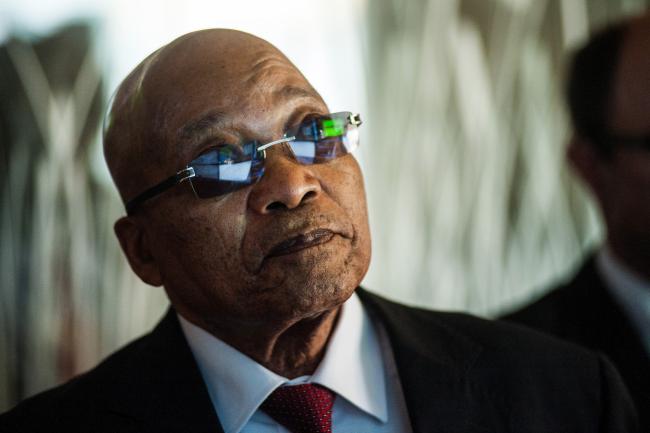(Bloomberg) -- A South African judicial commission investigating the alleged plunder of state funds during former President Jacob Zuma’s rule begins public hearings on Monday that could have potentially dire consequences for the ruling party.
The probe led by Deputy Chief Justice Raymond Zondo will likely implicate a number of the African National Congress’s past and serving leaders in what’s widely become known as state capture -- reputational damage it can ill afford as it gears up to contest next year’s elections. Ex-Finance Minister Pravin Gordhan, who now oversees state companies, has said more than 100 billion rand ($6.7 billion) may have been stolen.
“The ANC will be on trial through this commission,” Ralph Mathekga, a Johannesburg-based independent political analyst, said by phone on Friday. “This commission is likely to reveal the extent to which the ANC as a party has been compromised.”
Cyril Ramaphosa won control of the ANC in December and became president two months later after the party forced Zuma to step down following a scandal-marred tenure that lasted almost nine years and caused it to bleed support. While he’s pledged to clamp down on graft and restore public trust in state institutions as part of a drive to woo $100 billion in new investment, law enforcement agencies have been slow in apprehending suspects implicated in the looting.
Appropriate Follow-Up
The commission may not unearth a slew of new information and its success will largely depend on whether there is appropriate follow-up by the police and prosecutors, according to Ivor Sarakinsky, academic director at the University of the Witwatersrand’s School of Governance.
“So much of the information is already in the public domain,” Sarakinsky said by phone. “The only way that the public is going to accept any government action is when the prosecution entities do their work and they start to see people in court and going to jail for the theft of public finances and the corruption that has taken place.”
The ruling party said the commission has its full support.
“The ANC views the allegations of state capture as extremely serious, as this phenomenon increasingly appears to have paralyzed critical organs of state” and caused the economy to bleed billions of rand, the party said in an emailed statement on Friday. “We have the utmost confidence in the commission of inquiry led by Justice Zondo to investigate this matter and put in place remedial actions that will further strengthen our democracy.”
Undue Influence
Thuli Madonsela, the nation’s former anti-graft ombudsman, ordered the establishment of the judicial probe after her own investigation indicated that Duduzane Zuma, the ex-president’s son, and the three Gupta brothers who were his business partners, had exercised undue influence over state contracts, appointments and decisions. Zuma’s son and the Guptas have denied wrongdoing.
Zondo’s panel expects to take two years to probe an array of deals between state entities and private businesses and interview scores of witnesses, many of whom may be reluctant to give evidence because they risk implicating themselves.
Former Deputy Finance Minister Mcebisi Jonas is due to testify about his allegations that one of the Gupta brothers offered him the finance minister’s post, 600,000 rand in cash and another 600 million rand deposited into an account of his choice on condition he fire treasury officials who were blocking deals the family’s companies wanted to do with state firms.
Other witnesses to be called over the next few weeks include former ANC lawmaker Vytjie Mentor, who also said the Gupta offered her a cabinet position, and Themba Maseko, the former head of the government communication service who told Johannesburg’s Sunday Times newspaper that Zuma instructed him to help the Guptas.
Read more about the cases the commission will have to probe.
“The commission as a process is important because it may contribute toward accountability and transparency,” said Dirk Kotze, a political science professor at the University of South Africa in Pretoria. “But the final test will be what they do afterward once they have the findings of the commission.”
(Updates with list of witnesses in fourth paragraph below Undue Influence subheadline.)
